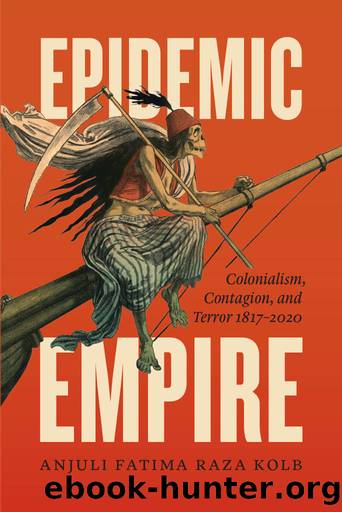Epidemic Empire by Anjuli Fatima Raza Kolb

Author:Anjuli Fatima Raza Kolb [Raza Kolb, Anjuli Fatima]
Language: eng
Format: epub
Tags: LIT000000 Literary Criticism / General, REL037000 Religion / Islam / General, POL037000 Political Science / Terrorism, REL078000 Religion / Fundamentalism
ISBN: 9780226739359
Publisher: University of Chicago Press
Published: 2021-02-08T18:30:00+00:00
Every time I tried to tell him what had been done to me he said âOh, thereâs no harm in that, no harm at all.â He scarcely examined me at allâthe whole thing was over in about two minutes. . . . He felt my ribs and looked at my fingers, saying, âNothing serious here, nothing to worry about.â I didnât even undress! (54; 51â52)
Beauvoir, both in her article for Le Monde and later in her introduction to Halimiâs book about the case, describes the reaction of the president of the Committee of Public Safety in France, Maurice Patin, to Boupachaâs complaints of being raped. Relieved to hear she had not been forced to sit on the bottle, â[he] feared at first that she might have been violated per anum, as was done on occasion with the Viets in Indo-China: such treatment results in the perforation of the intestines, and is fatal. But this is something quite differentâ (9; 2). Beauvoir adds, â[C]learly nothing of the sort could ever happen to himâ (avec le sourire dâun homme à qui on ne la fait pas) (9; 2fn). Patin would later confess that while he had sympathy for Boupachaâs plight, it was difficult for him to empathize with her. She was not a pleasant girl, she imagined herself too easily as some kind of latter-day Jeanne dâArc (97; 94). French Minister of Justice Edmond Michelet, in response to the Djamila Boupacha Committeeâs insistence that her case be tried in France rather than Algeria, would diagnose the source of Boupachaâs ills rather differently; as reported by Beauvoir he explained, âThe Nazis are responsible for this canker (gangrène) in our midst. It spreads everywhere, and corrupts all it touches. You canât eradicate it. . . . A canker in our midstâ (14; 6).
Two things changed the course of Boupachaâs trial and caused it to transcend the thousands of others awaiting some form, or at least performance, of justice in Algeria: these were the transfer of the proceedings to France, tirelessly fought for by Halimi, whose travel to and from Algeria was, like many Parisian lawyers (or as they were known in the colony âFLN lawyersâ), restricted and strategically blocked by Algerian authorities, and secondly the resonance of her girlhood and the loss of her virginity for the makers of left public opinion in France, who eventually triumphed in getting Boupacha a new medical examination in late July 1960, five months after her torture. Though they could not attribute her many scars to electrical or cigarette burns without a skin biopsy, which they refused to do, a committee of five doctors, including a woman, Hélène Michel-Wolfrom, would report:
Download
This site does not store any files on its server. We only index and link to content provided by other sites. Please contact the content providers to delete copyright contents if any and email us, we'll remove relevant links or contents immediately.
The Lost Art of Listening by Michael P. Nichols(6495)
Why I Am Not A Calvinist by Dr. Peter S. Ruckman(3779)
The Rosicrucians by Christopher McIntosh(3062)
Wicca: a guide for the solitary practitioner by Scott Cunningham(2712)
Signature in the Cell: DNA and the Evidence for Intelligent Design by Stephen C. Meyer(2508)
Real Sex by Lauren F. Winner(2491)
The Holy Spirit by Billy Graham(2435)
To Light a Sacred Flame by Silver RavenWolf(2361)
The End of Faith by Sam Harris(2301)
The Gnostic Gospels by Pagels Elaine(2041)
Nine Parts of Desire by Geraldine Brooks(2011)
Waking Up by Sam Harris(1969)
Heavens on Earth by Michael Shermer(1961)
Devil, The by Almond Philip C(1910)
Jesus by Paul Johnson(1897)
The God delusion by Richard Dawkins(1859)
Kundalini by Gopi Krishna(1830)
Chosen by God by R. C. Sproul(1771)
The Nature of Consciousness by Rupert Spira(1694)
